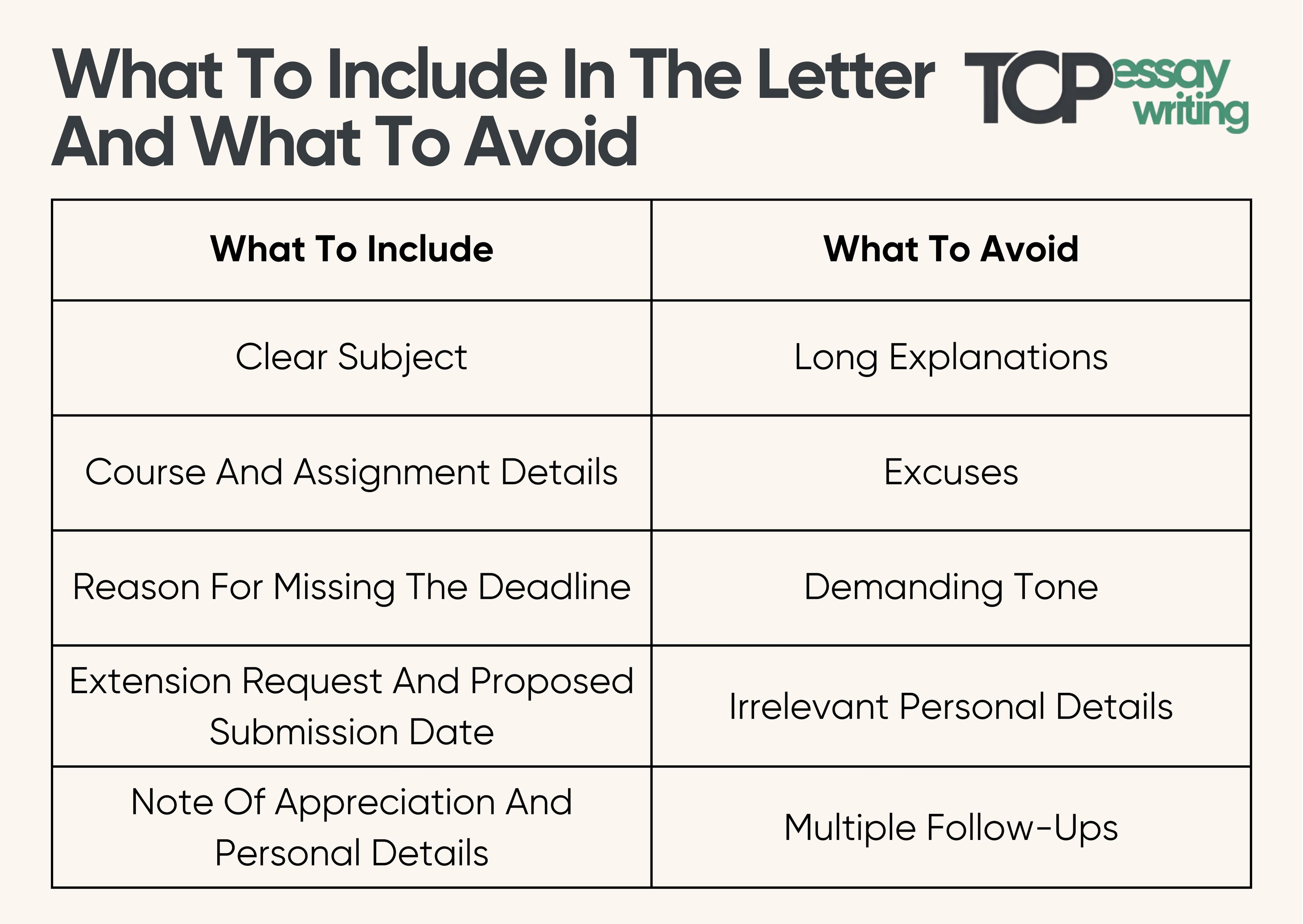Top Special Offer! Check discount
Get 13% off your first order - useTopStart13discount code now!
Best Way to Email a Professor About a Late Assignment
At college, it is standard to have multiple deadlines at once and to balance those with your personal responsibilities. Because of this, there may come a time when you will miss an assignment deadline. In such a situation, it is important to apologize to your professors by approaching them respectfully and professionally. You can email the professor about the late assignment:
“I would like to apologize for submitting the assignment late. Please know that I take your class very seriously, and be assured that I will try to avoid missing the deadline again. Please extend the deadline on this paper, if possible.”
Sending an email like this when you’re not experienced in doing so, and with the possibility of your grade hinging on getting it right, isn’t easy. A good relationship with your instructor and your likelihood of leniency depends on your ability to admit guilt while not overstating it. A lot can go wrong. This is why, in this article, we will explain how to email a professor about a late assignment.
What Should Such a Letter Be Like?
Any letter to your professor should be short, polite, and formally worded, especially when you confess a mistake and/or ask for a favor. If you’re nervous about composing such a letter yourself, ask a top essay writing portal to write or edit it for you. In your letter, you should admit the missed deadline and then say that you’re ready to deal with the problem. Here’s how such a letter may look like:
- Respectful tone: Begin the email by addressing your professor respectfully.
- Apology: Apologize sincerely for missing the deadline.
- Explanation: Offer a brief, valid reason for the late assignment.
- Solution: Provide a plan for when you will submit the assignment.
- Gratitude: Thank the professor for their time and consideration.
What Information Should the Letter Contain?
Consider this When thinking about emailing a teacher about late work. Professors are busy, so a properly formatted, short email can affect how they react to your request. You want to tell the truth clearly without taking up too much of their time and making it seem like your coursework is a low priority. You don't want to appear as if you buy assignment papers on the regular and don't care about your classes. Having the right details in your email will help your professor quickly evaluate the situation and consider giving you an extension. Below, we'll outline the most important things that your email should contain to ensure that it sounds professional and gets your point across.
- Subject. Mention the purpose of your email.
- Course. Provide the course title and your name so the professor can quickly identify you.
- Assignment name. Mention which assignment you missed.
- Reason. Provide a short, valid explanation for why it is late.
- Deadline extension request. When you email a professor about a late assignment, politely ask for an extended deadline.
- Your plan. Specify when you plan to submit the assignment.
- Thank you. End by expressing your appreciation.
- Your personal details. Provide your full name and other relevant information, including your contact details.

What Will Be Considered Unnecessary in the Letter?
Mind your tone when considering how to ask a professor to reopen an assignment. Professors don't appreciate rambling or any unnecessary details. They want the facts, not some long-winded story about why you missed the deadline. If you go on for too long, you risk being unprofessional or defensive. However, you can't just say, "I didn't write my assignment on time, sorry." Here's what you shouldn't include in your email to avoid wasting your professor's time.
- Long explanations. Keep your reason for the delay brief and to the point.
- Excuses. Avoid making it sound like you're giving excuses or blaming others.
- Demanding tone. You should politely request, not demand, an extension.
- Excessive details. Your professor doesn't need or care to know unnecessary facts about your personal life.
- Irrelevant information. Stick to the issue at hand – no need to bring up unrelated topics.
Step-by-Step Guide on Crafting the Email
Pondering how to ask a teacher to grade a late assignment can be nerve-wracking. However, if you keep it respectful, brief, clear, and concise, request an extension for a valid reason – and gracefully accept it if they decline – you will likely earn a better response. You should apologize for your error, explain the delay, and ask for an extension while respecting their time and understanding. Here is a step-by-step guide on writing an effective and less daunting email.
- Approach writing with a cool head. Pause before writing to collect yourself.
- Check the syllabus. Review the course policy on late assignments.
- Prepare your reason. Make sure your explanation is brief and honest.
- Decide on your request. What is it that you want? For example, an extension.
- Write a brief yet effective email. Use our guide and example below to know exactly how to email a professor about late work.
- Pick a good time to send your email. Send it during business hours, between 9 a.m. and 5 p.m.
- Use a professional tone. Be respectful and avoid informal language.
- Proofread your email. Double-check for typos and clarity.
- Send and be patient. Give your professor time to respond before following up.
What Should Be the Subject Line of an Email? With Examples
Your subject line is the first thing your professor will see in your email. Make it count. An explicit, well-written subject line will ensure your professor recognizes your email's purpose immediately. Professors receive hundreds of emails each week, so a clear subject line will help them identify your request quickly and provide a timely response. So, if you're wondering how to ask a professor to accept a late assignment, start with a strong subject line. Here are some subject line examples to help you create an appropriate start for your letter.
- Request for Late Assignment Submission: [Course Name]
- Late Submission Request for [Assignment Name]
- Apology for Late Submission – [Your Name]
- Request for Deadline Extension on [Assignment Name]
- Late Assignment Submission Request
Letter Example
Here’s a simple and respectful email late assignment email example you can use:
Subject: Apology for Late Submission – [Your Name]
Dear Professor [Last Name],
I hope this email finds you well. I am writing to express my sincere apology for not having submitted my paper for [name of course] by the requested deadline. Despite my intention to deliver the paper on time, I was, regrettably, delayed by [brief reason].
I understand the importance of deadlines and do not mean to suggest that I am exempt from them. I can submit the assignment by [your proposed deadline]. I would greatly appreciate it if you could grant me this extension.
Thank you for your time and consideration.
Looking forward to your reply.
Best regards,
[Your Full Name And Contact Details]
If you use this sample email to professor about late assignment, you can expect to get a positive reply. You can also check our essay examples database for more professional writing samples for various occasions. We update it regularly to make sure our readers have all the resources they need to ensure their academic success.
FAQ
1. What is the best time to send an email?
If you want your email to be read and responded to quickly, always send it during the regular working day and between 9 AM and 5 PM on weekdays, when professors check their inboxes. Send that email as soon as possible so your professor is more willing to push back your deadline.
2. What reasons will not be considered valid for postponement?
When you think of an excuse for late assignments in college, know that oversleeping, poor time management or forgetfulness is not usually considered valid reasons for asking for an extension. Educators expect students to manage their time appropriately and meet assignment deadlines unless there is a legitimate and unavoidable problem, such as a personal illness or emergency.
3. How big should the email text be?
Punctuality is a sign of respect, so when you’re thinking about how to email a professor about late work, make sure that your email doesn’t contain unnecessary information. Keep it short. Four to six sentences is a good range. Communicate your apology, explain the reason for the delay, and offer your proposed solution. Keeping it short shows respect for your professor’s time.



